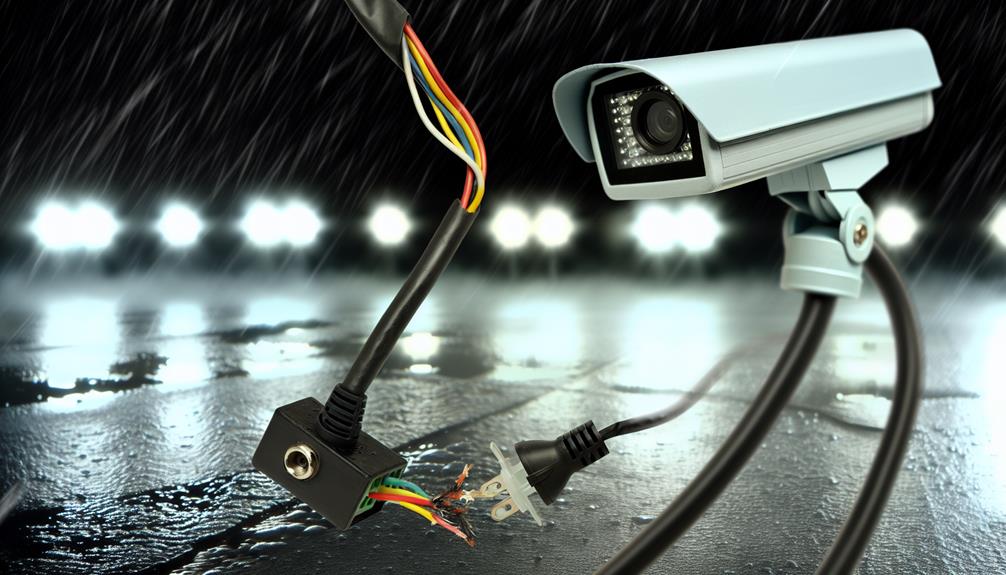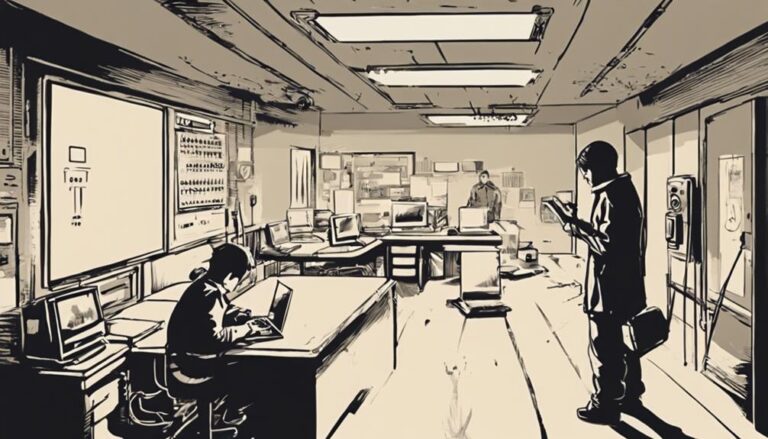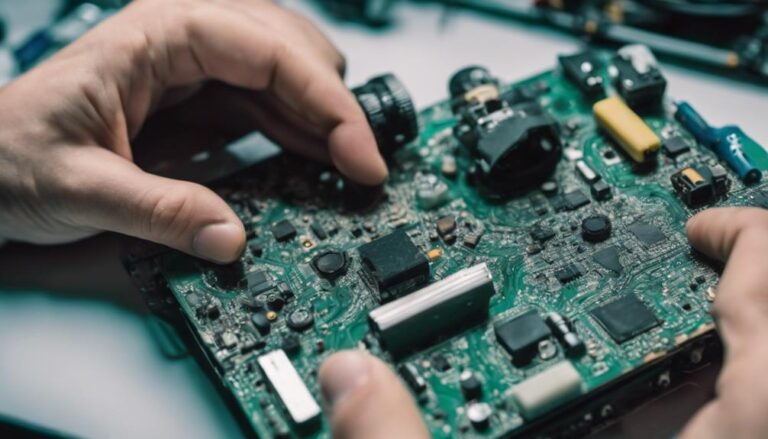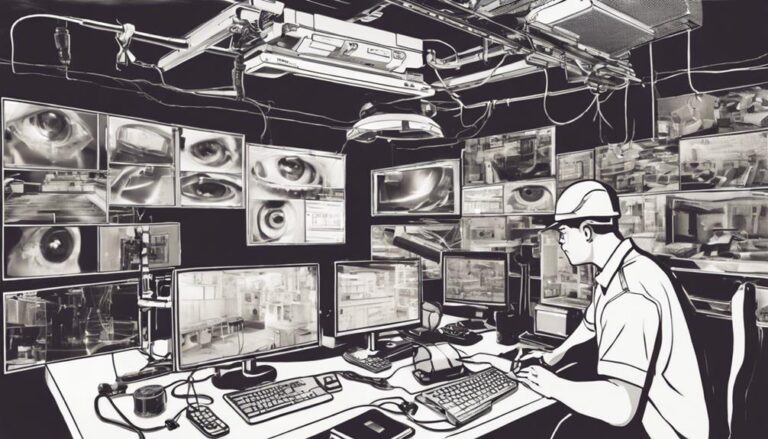If your CCTV camera isn't working, a power supply issue is often the culprit. Power surges, overloading, short circuits, and overheating can all disrupt functionality. First, check if the voltage and current match the camera's requirements. Use a multimeter to test the power output. Inspect for any burnt components or physical damage. Verify all cables are secure and the power input is stable. Overheating might need better ventilation or replacing faulty parts. Regular inspections and using a UPS can prevent future issues. Understanding these points can keep your CCTV system running reliably. More details can enhance your troubleshooting skills.
Common Power Supply Issues
Power supply issues in CCTV cameras often arise from power surges, overloading, short circuits, heat accumulation, and compatibility problems. These common issues can disrupt your surveillance system, leaving you vulnerable. To make sure your CCTV cameras function flawlessly, understanding these power supply issues is essential.
Power surges are sudden spikes in electrical voltage that can damage the internal components of your CCTV cameras. Overloading occurs when the power supply can't handle the total power demand of all connected devices, causing the camera to shut down. Short circuits, often due to faulty wiring, can disrupt power flow and prevent the camera from working. Heat accumulation, resulting from poor ventilation or excessive power draw, can lead to overheating and malfunction. Compatibility problems arise when the power supply voltage or amperage doesn't match the camera's requirements, causing operational failures.
To prevent these issues, make sure your power supply is adequate and compatible with your CCTV cameras. Regularly check for any visible signs of damage or overheating. Properly organize and maintain cables to avoid short circuits. By addressing these common issues, you'll maintain a reliable and continuous surveillance system, ensuring your freedom and security.
Diagnosing Power Problems
When diagnosing power problems in CCTV cameras, you'll need to start by checking the voltage and current requirements specified by the manufacturer. Use a multimeter to test the output of your power source, ensuring it aligns with these specifications. An inadequate power supply can cause intermittent functionality or complete failure.
Look closely for signs of damage, such as burnt components or connectors, which might indicate power surges or fluctuations. This is vital, as these issues can irreparably harm your camera. Make sure it works properly by confirming the power input is stable and consistent. Overheating is another red flag; it often results from improper power input and can severely damage the internal circuitry.
If your camera isn't performing as expected, consider the power supply itself. Professional CCTV setups often require specific power supplies to function optimally. Verify that the power source you're using meets the required specifications. If not, replacing it with a suitable one could resolve the issue.
Fixing Power Supply Issues
After diagnosing the power problems, the next step is to address and fix any identified issues with the power supply. To ensure your camera performs at its best and maintains a stable video signal, follow these steps:
- Check Power Connections and Cables: Secure and undamaged connections are essential. Inspect all cables and connectors to make sure they are intact and properly plugged in. Loose or damaged cables can lead to performance issues.
- Use Uninterruptible Power Supply (UPS): A UPS can provide backup power during outages, ensuring continuous operation of your CCTV system. This additional power source can help prevent unexpected camera shutdowns and maintain video recording integrity.
- Update Firmware: Outdated firmware can cause various performance issues. Make sure your camera's firmware is up-to-date. Regular updates can fix bugs and enhance the overall functionality of the power supply system.
- Regular Inspections: Periodically check the power supply for signs of wear and tear. Regular maintenance can detect potential problems early, preventing failures that could compromise your surveillance system.
Preventive Maintenance Tips
To safeguard your CCTV system operates at its best, regularly inspecting power supply connections and cables is essential for preventing signal loss and maintaining reliability. Start by inspecting cables for any visible damage, such as fraying or wear, which could compromise the power supply. Address these issues promptly to maintain the system's functionality.
Implement proper ventilation to prevent heat accumulation around the power supply, as excessive heat can cause significant damage over time. Ensure that your setup includes adequate airflow to mitigate the risk of overheating.
Organize cables neatly to avoid potential short circuits. Tangled or improperly managed cables can lead to unexpected power failures, making your surveillance system unreliable. Use cable ties or conduits to keep everything orderly and secure.
To protect your power supply from surges, consider installing surge protectors or uninterruptible power supplies (UPS). These protective measures can prevent sudden voltage spikes from damaging your equipment.
Professional Assistance
Sometimes, enlisting professional assistance is essential for resolving intricate CCTV camera power supply issues effectively. Skilled experts possess the technical knowledge to accurately diagnose and address complex problems that could otherwise lead to extensive downtime or even damage to your CCTV system. Electrical equipment can be sensitive and prone to issues that aren't immediately apparent, making professional help invaluable.
Professional assistance guarantees your camera works reliably, preventing unexpected interruptions that can compromise security. Here's why seeking expert help is beneficial:
- Accurate Diagnosis: Professionals can pinpoint the exact cause of power supply failures, guaranteeing targeted and effective repairs.
- Prevent Damage: By properly addressing power issues, experts prevent potential damage to your CCTV cameras that could occur if problems are left unresolved.
- Reliable Performance: Regular maintenance and proper repairs conducted by skilled technicians ensure the long-term, reliable performance of your CCTV system.
- Peace of Mind: Knowing that your power supply issues are managed by experts allows you to focus on other priorities without worrying about your cameras stopping recording unexpectedly.
Don't let complex power supply problems disrupt your security. Investing in professional assistance guarantees your CCTV system remains functional and dependable.
Frequently Asked Questions
Can CCTV Power Supply Be Repaired?
Yes, CCTV power supplies can be repaired. You've got repair options: DIY fixes for common issues with basic troubleshooting steps, or seek professional help. Consider replacement if repairs fail. Maintenance tips guarantee longer lifespan and efficiency.
How Do I Know if My CCTV Power Supply Is Working?
Did you know 85% of CCTV issues are power-related? To check if yours is working, perform a voltage test, observe the power indicator, inspect wiring, verify the power outlet, check the backup battery, and surge protector. Consider professional inspection.
How to Check if a Security Camera Is Getting Power?
To check if a security camera's receiving power, do a voltage check with multimeter usage on the power adapter. Confirm connection test on power cable, electrical outlet works, and surge protection's intact. Consult camera manual for details.
What Is the Common Problem of a CCTV Camera?
You'll commonly face issues like faulty connections, voltage fluctuations, overheating, power surges, short circuits, and water damage. Corrosion problems can also disrupt functionality. Regular maintenance and inspections are essential to keep your CCTV camera running smoothly.



